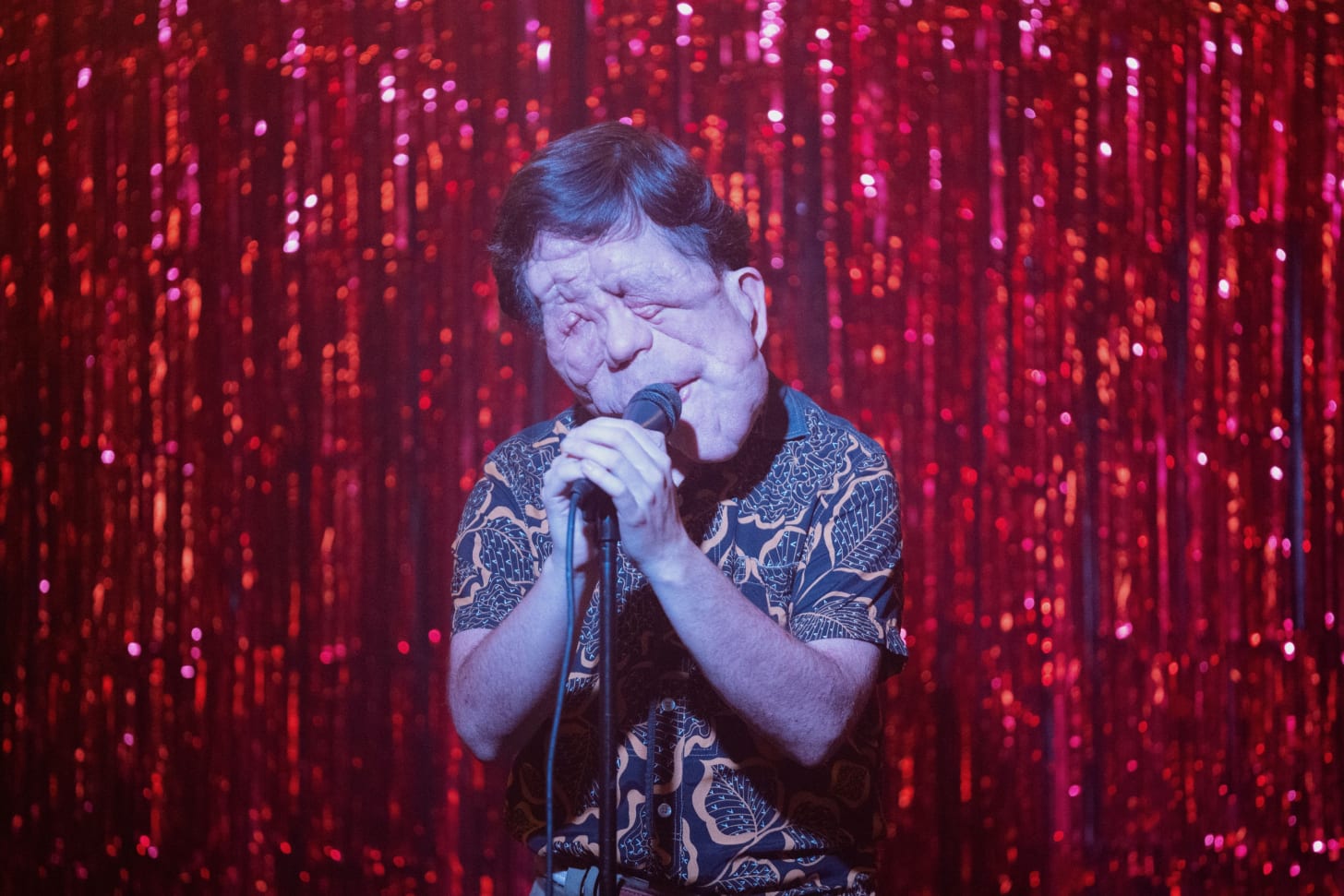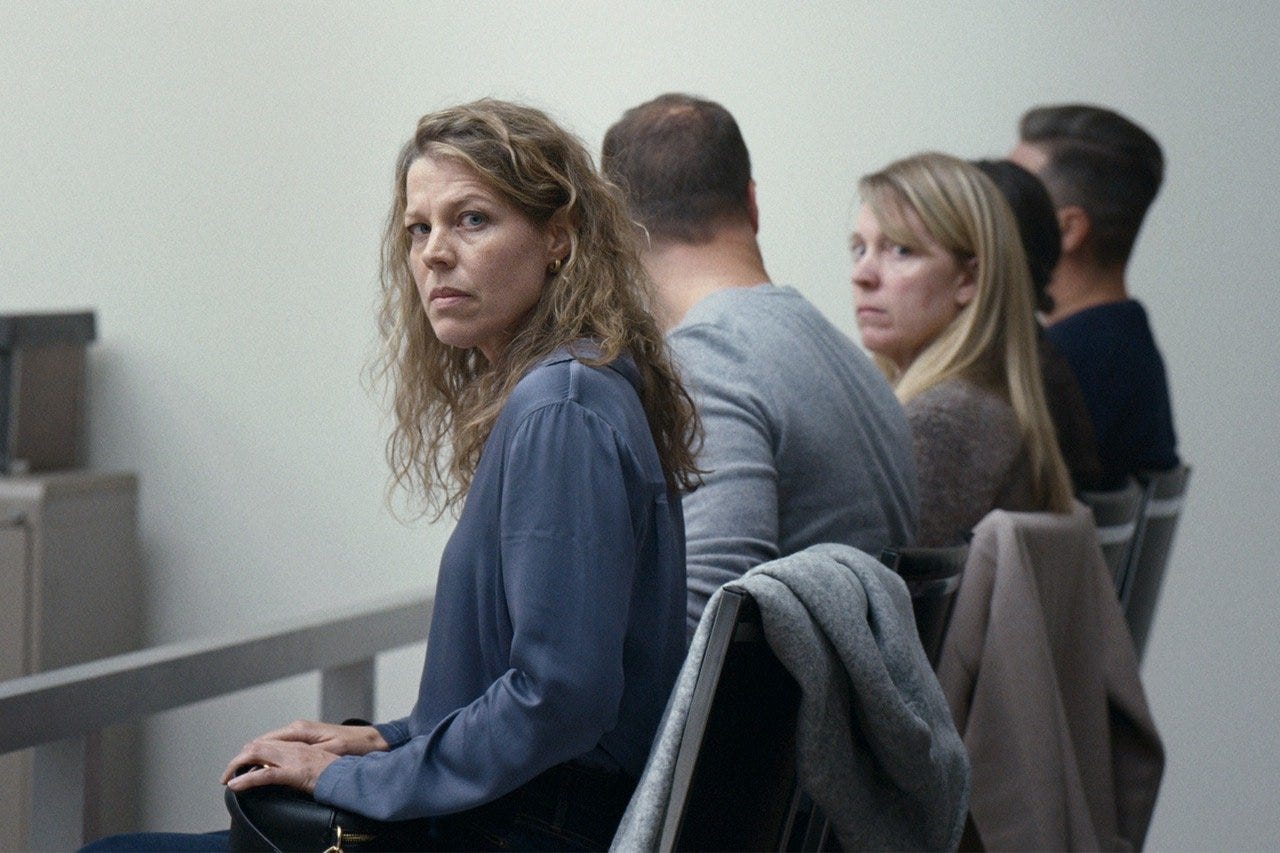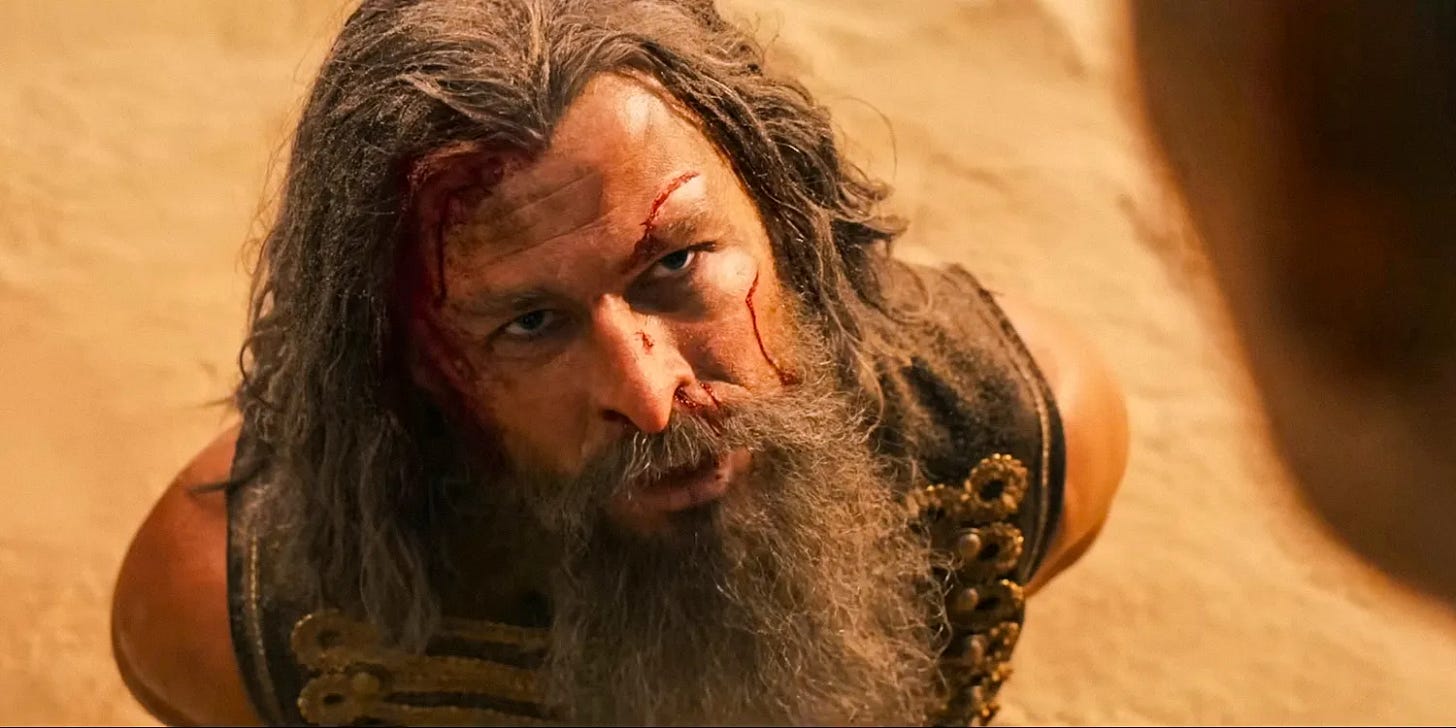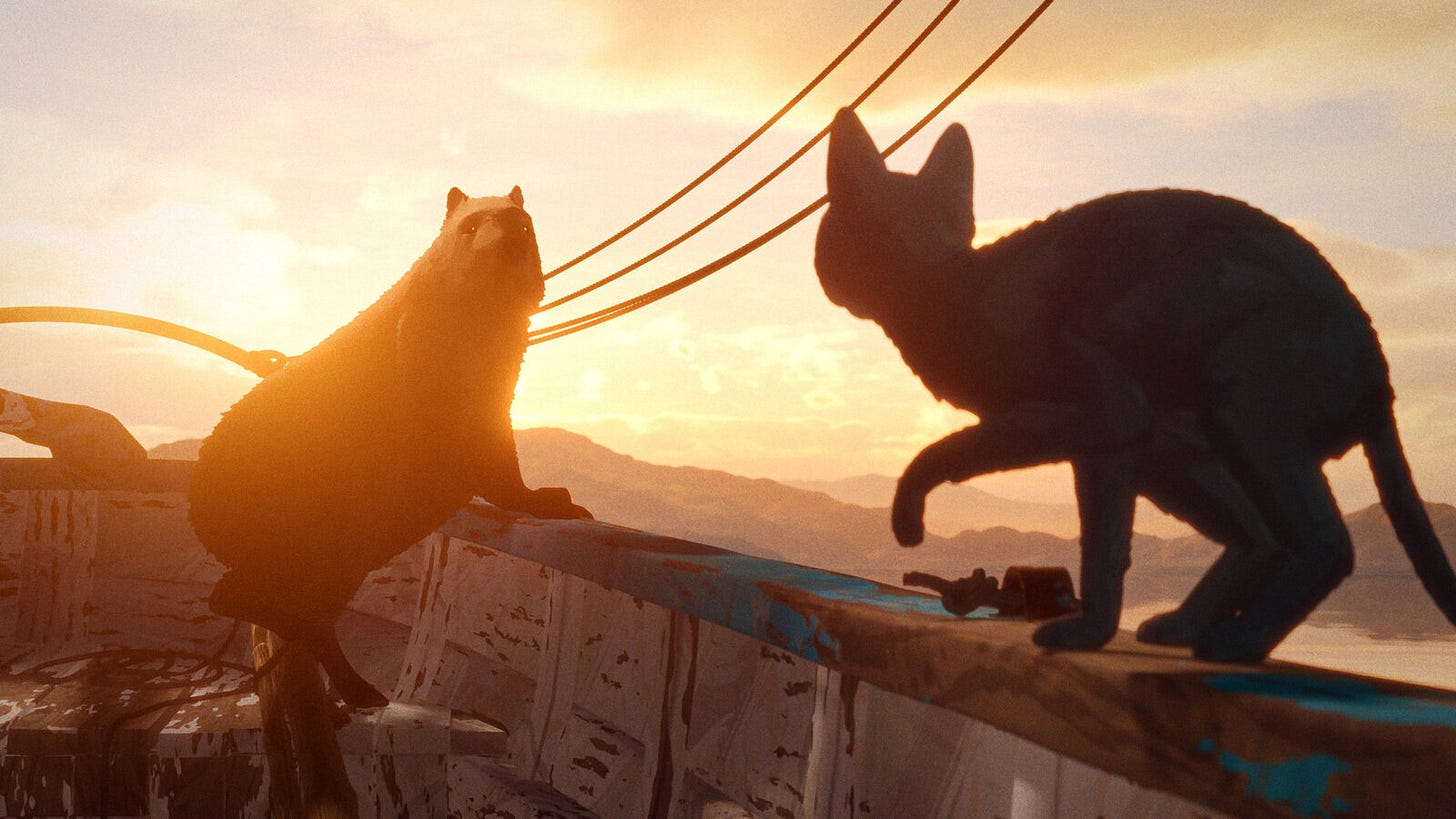Angle On: 2024
My favorite moments from a year at the movies
In my heart of hearts I don’t believe that art should be competitive. That one film or song or book or painting or performance can really be judged against another, or that there should be anything like winners or losers when it comes to creative pursuits. However, I also love making lists. Lists of movies, in particular.
Last year, rather than list out my top ten favorite films—something that pretty much everyone everywhere does nowadays (and I eat it up)—I wanted to make a list that did that work of looking backwards and appreciating a year at the movies but also kept with the spirit of this newsletter; that is, focusing in on specific moments that stuck with me for whatever reason. These are not necessarily my favorite films overall, but they do contain those moments which kept replaying in my head, granting inspiration, and often taking on new meaning the more I considered them.
Last year, when making a similar list, I wrote that, as a movie year, 2023 felt big. If that was the case, which I still believe it was, this year felt small. There were fewer movies I loved, but there were a handful that felt deeply and even profoundly meaningful. The moments my mind continues to snag on from 2024 are, in most cases, quieter, smaller, more intimate and generally a bit more…peculiar. Moments that challenged me, kept me thinking, and led to some really fantastic conversations with people after the credits rolled (which is one of the greatest gifts a movie can give).
With that in mind, I’m opening up the comments on this post, and hope to hear from you about your favorite moment or moments from films in 2024. For now, here’s what’s still kicking around in my head as we leave the old year behind.
Sleepover- I Saw The TV Glow (dir. Jane Schoenbrun)
I Saw The TV Glow has planted itself more firmly in my mind than any other film this year for it’s open-veined yet idiosyncratic approach to themes of connection and disconnection through media, the things we hide within ourselves that others nevertheless see, and how time quickly alters or dims the things we once believed would be meaningful forever. That sounds like a lot to explore, but Jane Schoenbrun’s film feels much more like an impressionist painting than an essay. Or maybe an impressionist painting done with glow pens and projected from a box tv in the corner of the room after your parents have gone to bed. The entire experience of watching (and rewatching) it felt both bracingly new and achingly familiar.
Sequences that stand out are a long walk through a school’s hallway set to Caroline Polacheck’s “Starburned and Unkissed” (the best track on a fantastic, thoughtfully curated OST), a nefarious monologue from the moon-faced Mr. Melancholy, and a handful of quiet yet uncanny scenes of eerie suburban malaise struck through with neon and static. The moment that struck me most profoundly comes at the conclusion, but I would hate to spoil this for anyone who hasn’t seen it, so instead I’ll pick one of the early scenes when Owen (Justice Smith) sneaks over to Maddy’s (Bridgette Lundy-Paine) house to watch a tv show called The Pink Opaque for the first time. Not only is the show-within-the-film a pitch perfect rendering of certain 90s young adult television (I wonder if this hits quite as hard for people who didn’t grow up with Are You Afraid of the Dark, X-Files, Buffy, and The Adventures of Pete & Pete) but we can also see and feel the bond that forms between these two people as they experience the show together. Watching TV can easily look passive and not particularly cinematic, but it is also experience that can launch life-long friendships, cause rifts, sow doubts, create new fears, and cement affinities that in time come to define us, for better or for worse. This scene (and most of the film, really) is a portrait of the simple yet profound experience of sitting beside someone and silently sharing a moment of closeness that, for some, is only possible when there is a screen (veil, mask, construct) present to make us feel safe and whole, if only until the next commercial break.
I Wanna Get Next To You - A Different Man (dir. Aaron Schimberg)
I’m a sucker for an emotional and sci-fi tinged premise, so naturally A Different Man was a film that I was anticipating for most of the year. A story of a closed-off and shy man who cures his facial disfigurement only to meet another man with a similar appearance who is nonetheless exuberant and magnetic seemed like a great idea, but also seemed a little neat and tidy as a parable about appearance (even one’s own appearance) being deceiving. I was excited by the idea and the talent involved, but was nervous that this would ultimately turn out to be little more than a morality tale (or just a knock-off Charlie Kaufman).
To my delight, A Different Man is not a neat and tidy story, and it is compellingly unique in its composition. It followed through on its premise but quickly swerved, and kept swerving, in ways that surprised me, and made choices that seemed odd in the moment but in the end (and in retrospect) made the whole story a deeper, more specific and a far less broadly metaphorical story than I had feared it might become.
Sebastian Stan is wonderful as Eddie, exuding not just heart-breaking timidity, but manic rage and mute bewilderment. Perhaps the most interesting character in the film is his neighbor (Renate Reinsve) as a playwright who quickly takes ownership of his story as her own, contorting and diluting his life into that very neat and tidy parable I feared the movie would itself become. But the undeniable special ingredient is Adam Pearson, who steps into the dour world of this film like a lightening bolt of palpable (yet somewhat sinister) charm. An undeniable high point of the story comes when Pearson’s character Oswald does a karaoke rendition of “I Wanna Get Next To You” as Eddie watches. Pearson’s performance is natural and lovely, and Eddie’s bemusement that this man can embody those things he always wanted to be with such seeming ease makes for one of the year’s best scenes.
There is a lot more to say about A Different Man, which is an incredible study of a trio of dynamic and complex characters, but next on my list is my favorite trio of the year.
Match Point - Challengers (dir. Luca Guadagnino)
The set up is simple. Two old friends, one at a low point and the other facing the fact that he may have peaked, face off on a tennis court, watched by a woman who has been, for both of them, an object of affection and a source of inspiration. Each of them needs and wants something from the other. They bring out the best and worst in each other. Tennis is sex. Sex is tennis. In other hands this same story might be little more than a romantic dramedy with a clever framing device (it might even have turned out flat out cheesy). But Challengers really, really works, and has somehow stayed fixed at the top of my list of my favorite movies of the year.
I love romantic comedies — especially the ones that are focused more on the characters than on the courtship. I like to get to know characters, to really invest in them, and most of all I love when a film takes its time to allow me to see characters change and grow and falter through years (When Harry Met Sally, Notting Hill, etc.). Challengers isn’t so much focused on who gets the girl (or who gets the boy, or boys) but rather on the complex dynamics between Art (Mike Faist), Patrick (a stellar Josh O'Connor), and Tasha (Zendaya, in her best role of the year, sorry Dune), which are loaded with not only attraction but ambition. The structure of Challengers gives us key glimpses that span a decade or so, allowing us to become truly invested in these people (love or hate them or both) to the point where a once simple match of tennis takes on incredible weight.
I don’t particularly like sports movies. It’s not that I don’t care for watching sports (not just that), but that sports movies often feel incredibly simplistic in terms of good vs bad, hero vs villain. We often get to know the team (or person) we’re supposed to root for, and the other team (or person) is just…present. There to be beaten, or heroically lost to, in the final moments. Here, we are deeply invested on both sides of the net, and even in the stands. Each and every swing of the racket has years of dynamics and emotion behind it. the pull towards picking sides is rendered virtually inert. There is something at stake deeper than a prize or even momentary glory, and we want something more than a win or a loss. There is a real relationship at stake (or two or three) that can, at match point, discover either its final punctuation or its resurrection.
I’m making this sound grand because, well, it is. Luca Guadagnino treats it that way, as do all three of the actors. Crucially, so do Trent Reznor and Atticus Ross who are doing work here that is both delightfully fun and sincerely propulsive. In the final 15 minutes or so of Challengers, every moment in the story and every choice of its telling coalesce and what we get is, in my opinion, the flat out most fun and engaging and exciting moment at the movies this year.
Dress-up - Red Rooms (dir. Pascal Plante)
If the ending of Challengers was the most engaging moment in a positive sense (fun, exciting), then the flip side to that coin is another moment that was just as engaging, though in a far more chilling way.
Red Rooms is the definition of a film that gets under your skin. It deals not just in the illicit and horrific but with a character who is fascinated with the illicit and horrific. A person enamored with and guided by an affinity for darkness in ways that remain mysterious to us, and possibly even to her. Red Rooms plays out partially on computer screens and partially in a courtroom, where a man is on trial for crimes that, well, frankly just thinking about them scares me more than any horror movie I saw this year (and this film is not all that graphic, at least not visually). The families of his alleged victims are present in the room, but so are his fans. One fan in particular, who, in one of the most stunning and unnerving moments in any film I can remember, transforms into more than just a silent spectator.
I won’t say more, because seeing Red Rooms is an experience that I wouldn’t want to describe. Experiencing it is the point. If you are interested in what drives our fascination with true crime or the innate sense of morbid curiosity that exists in humans (some much, much more than others) then I suggest watching Red Rooms. If you like scary movies but this one feels like too much real horror, then move on to this next one.
Tent - Oddity (dir. Damian Mc Carthy).
I wanted to give a quick nod to my favorite jump scare of the year, which comes early on in Oddity, a scrappy and cool Shudder original from Irish filmmaker Damian Mc Carthy. Oddity begins with a woman alone in a house, confronted by a very frightening dilemma: a man arrives at her door at night asking to be let in, claiming that he saw someone enter the house. That someone is already inside. It’s a great idea, and keeps you wondering what you might do in that same scenario. The moment I want to highlight comes when the woman in the house zips herself inside a tent and watches footage from a camera set up in the house, and then—
Well, I screamed. My dog barked at me. We all had a good time.
French Cuisine - The Substance (dir. Coralie Fargeat)
As a fan of films like The Fly and The Thing and all manner of practical effects-laden horror, I’m so pleased to see a movie like The Substance breaking through to a wider audience, and even garnering awards acclaim. Even if the film isn’t my favorite from start to finish, it’s been great to see so many people experiencing such a wild new entry in the body horror genre.
But, I think its critical to note that this movie has two pretty distinct halves. The first is a big, honking metaphor tale about self-image and women’s bodies and aging in Hollywood. While all of that works just fine (thanks most of all to Demi Moore’s truly committed performance), there comes a moment about halfway through when The Substance stops being a movie about a single (albeit real and worthy) issue, and starts having some truly wild, gross, bloody fun. A shift when The Substance seems to look the audience right in the eye and says, “yes, it’s okay to laugh.”
This comes when Demi Moore, then entering a distinctly witchy era of her gradual physical transformation, starts getting busy in the kitchen. She begins to cook like a cartoon character hell-bent on massacring the contents of her fridge, and her behavior moves from self-loathing and maudlin to zany and maniacal. When the cookbook she has open says, simply, “eviscerate the turkey,” The Substance becomes a ride that can’t be missed (or, if you’re queasy, should be avoided at all costs).
Make It Epic - Furiosa (dir. George Miller)
It might surprise some that a certain sandy film didn’t make this list, and while I enjoyed a lot of aspects of Dune 2 (though I prefer the first one, for many of the same reasons I prefer the first half of Herbert’s novel), I was much more enamored with a different return to a different desert.
Fury Road is, to me, one of the best movies of my lifetime. It’s almost trite to even say so, but it’s proven to be a movie I can come back to over and over, and that I never get tired of. I could watch it right now. It has all of the things I look for—artistry, compelling characters, incredible world-building, a true sense of fun, and a kind of effortless grace despite the complexity of its construction. So naturally it was always going to be a tall order for George Miller to go back to the Wasteland. To my mind, the only thing he had to do was not repeat himself, and apart from one notable centerpiece sequence of Furiosa (which is fantastic, by the way) Miller did just what I hoped he would: something different.
For a lot of audiences, Furiosa was a disappointment. Its preoccupation with myth making, its focus on its enigmatic villain rather than the titular heroine, and its episodic structure were, for a lot of people I know, points against it. But these are all the things I truly loved about Furiosa. It had ideas beyond water and bullets and blood and chrome, and designs outside of thrill-ride spectacle. It doesn’t overtake Fury Road, which is near perfect, but its messy ambition left me smitten.
There are so many moments I would like to call out, but for me, Miller’s mission here comes into focus in the final showdown between Anya Taylor Joy’s Furiosa (she’s good, but no Charleze) and Chris Hemsworth as Dementus, in what is, in my opinion, his greatest performance (and it’s not even really close). The closing arguments of this movie - and yes, this climax is a conversation, not a chase - articulated ideas about right and wrong, power and cruelty, hope in the face of oblivion, and the true meaning of legacy. It also smash cuts to one of the most beautifully strange images I’ve ever seen on a screen. While Furiosa may not have garnered the out-of-the-gate monolithic appreciation that Fury Road won (and may not deserve it) I’m confident it will endure as an interesting, ambitious, and wonderfully strange work from one of the greatest, undaunted filmmakers of our time.
Flood - Flow (dir. Gints Zilbalodis)
I’d like to end on a quiet note. I think the less said about Flow, the better. After all, it is a film that speaks for itself by not speaking at all. A testament to observing behavior alone as a method of revealing deep ideas and forming connections.
In a world that might be our own, but also might not be, a small black cat struggles to survive, forms unlikely bonds, and witnesses things that feel ripped from a dream. There are so many moments I loved in this (and like several films on this list, Flow feels powerful as a collection of moments, rather than a streamlined unbroken tale) but the image that to me remains most indelible is the slowly (but not too slowly) rising water that overtakes the world, gradually submerging grass and trees and buildings and mountains. As it rises, there are moments of real, immediate panic that feel at least as powerful as those in non-animated films with characters capable of speech. It’s wonderful to be reminded that something so simple, so stripped down and bare, can communicate so much. Maybe especially now, a film as quiet and delicate as Flow was both a welcome escape and a deft articulation of anxiety and hope.
Movies I loved that didn’t make this list, but easily could have, are Evil Does Not Exist, A Real Pain, The Brutalist, Janet Planet, Exhuma, Love Lies Bleeding, and more. If you want to know more of my thoughts on movies in 2024, or see my ranked list of the 50+ movies I saw in theaters, follow me on letterbox.
Thanks for reading. See you in 2025.









